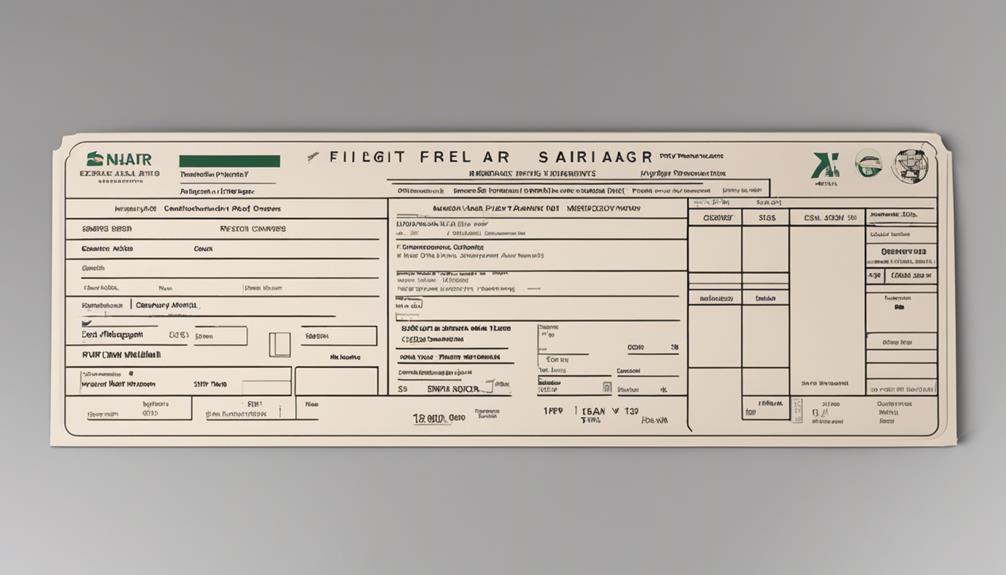Air Waybill (AWB) Definition and How to Get One
In the domain of international air courier services, the Air Waybill (AWB) stands as a cornerstone document, essential for the smooth flow of cargo. The intricacies of acquiring an AWB are often overlooked, yet they hold the key to efficient logistics and secure transportation. Understanding the nuances of AWB acquisition can greatly impact the reliability and timeliness of shipments, making it a fundamental aspect for both seasoned professionals and newcomers to the industry. Let's explore the importance of the AWB and the vital steps involved in obtaining this pivotal document.
Key Takeaways
- AWB is a critical document in air courier services acting as a contract of carriage.
- IATA sets specific requirements for air cargo shipments to obtain an AWB.
- AWB contains shipper and recipient details, cargo value, and special instructions.
- Issuance of AWB generates a unique tracking number for real-time monitoring.
- Electronic AWB formats ensure efficient processing and tracking for compliance.
Understanding the Air Waybill
In the domain of international air courier services, an essential document that plays a pivotal role in the shipment process is the Air Waybill (AWB). The AWB not only serves as a receipt of goods by the airline but also acts as a contract of carriage between the shipper and the carrier.
One critical aspect of the AWB is its tracking capabilities, allowing for real-time monitoring of the shipment's progress. Ensuring the accuracy of the information on the AWB is of paramount importance to avoid delays, misdeliveries, or potential disputes.
Any discrepancies in details such as shipper's and consignee's information, airport codes, or shipment value can lead to operational inefficiencies and financial losses.
Air Waybill Vs. Bill of Lading
A comparison between the Air Waybill (AWB) and the Bill of Lading reveals distinct differences in their legal nature and documentation requirements. Concerning legal implications, the Bill of Lading is a negotiable document that serves as a title of ownership for the goods, while the AWB is non-negotiable and acts as a receipt of goods by the airline.
Shipping regulations dictate that the Bill of Lading must detail goods type, quantity, and destination, serving as a receipt at the shipment's destination. On the other hand, the AWB solely focuses on transportation contracts and does not specify flight details or merchandise value.
Understanding these differences is essential for complying with international shipping regulations and ensuring smooth cargo transportation processes.
Requirements for Obtaining an AWB
The process of obtaining an Air Waybill (AWB) involves adhering to specific requirements set forth by the International Air Transport Association (IATA) for the seamless facilitation of air cargo shipments.
To acquire an AWB, the shipper typically initiates the process by completing an AWB application, providing essential details such as the shipper's and recipient's names, cargo value, airport codes, and any special instructions.
Once the application is submitted and verified, the AWB issuance takes place, generating the unique eleven-digit AWB number. This number is essential for tracking and tracing the shipment throughout its journey.
It is important to make sure that all information on the AWB is accurate and complete to avoid any delays or complications during transit.
Provider of Air Waybill Documents
IATA, representing a significant portion of global air traffic, plays a key role in providing standard Air Waybill (AWB) documents for air cargo shipments. These documents are distributed through IATA agreements, guaranteeing uniformity and compliance across the industry.
The use of electronic formats has become increasingly prevalent, allowing for efficient processing and tracking of shipments. Major airlines and parcel services like FedEx and UPS are part of the IATA network, further solidifying the reach and impact of these standardized AWB documents.
Necessary Information in Air Waybill
Providing the essential information needed in an Air Waybill guarantees accurate documentation and smooth processing of air cargo shipments. The Air Waybill must include key components such as shipper and recipient names, cargo value, airport codes, and special instructions. Ensuring these details are accurately recorded is of utmost importance as it facilitates tracking, compliance, and efficient handling of the shipment. Below is a table summarizing the necessary information to be included in an Air Waybill:
| Key Components | Instructions |
|---|---|
| Shipper's Name | Provide full legal name of the shipper |
| Recipient's Name | Include full legal name of the recipient |
| Cargo Value | State the declared value of the cargo |
| Airport Codes | Specify the origin and destination airport codes |
Conclusion
In summary, obtaining an Air Waybill (AWB) is vital for international air courier services to guarantee efficient tracking and tracing of goods.
Remember, 'measure twice, cut once' – accuracy and completeness in the AWB application process are essential to avoid delays and ensure smooth operations in air cargo shipments.
Mastering the requirements and necessary information in the AWB will streamline the transportation process and enhance overall logistics management.







